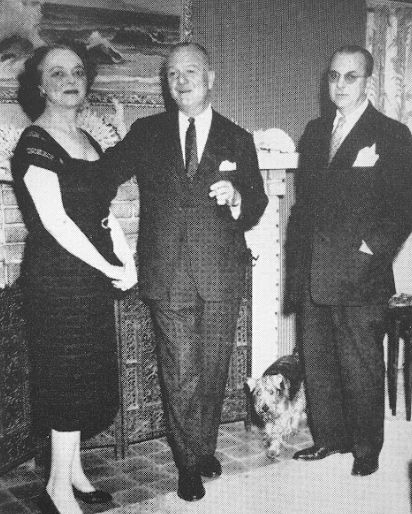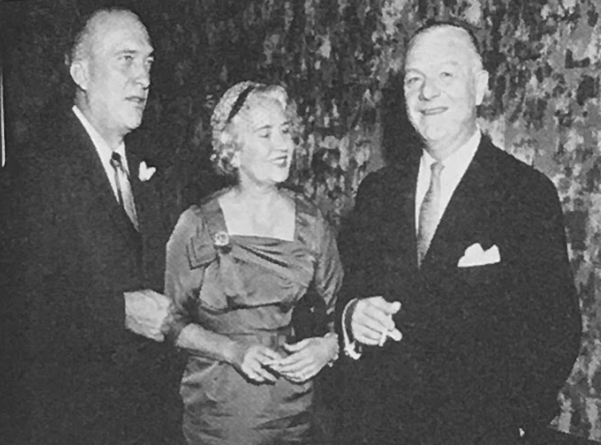Toast To Olde Tymes – Frank Fitzhugh Buckner Houston

Frank Fitzhugh Buckner Houston (as an adult, he pronounced his last name “Hewston,” although his brother Sid, a newspaperman, preferred “Howston”) was born in December 1899, near the tail end of the 19th century. He was a native of Mexico, Missouri. His father was Algernon Sidney Houston, a lumberman much involved in Masonic activities. His mother, Sarah Thornton Buckner Houston, who was known as Sallie, was the daughter of William Fitzhugh Buckner, a banker in Paris, Missouri. Frank was a graduate of the University of Missouri, where he was a member of Phi Beta Kappa honor society and Phi Delta Theta fraternity. While in college, he and fellow students Arch Rodgers and Edward Freivogel wrote several theatrical productions, including Green Jug and Ninth Deacon. The last one, The Breeze Bug, which was set in Greenland, was performed at Homecoming in the fall of 1922. The Columbia Evening Missourian noted that “Frank Houston will leave shortly to take an advertising position.”
During his years in Kansas City, Frank maintained a busy social schedule, while writing and working as an account executive for R. J. Potts & Company. His novel, Hooper Dooper, was published in 1930. The initial word from the Kansas City Star that April was favorable: “‘Hooper Dooper’ is a story of smart set life in a smart town. Mr. Houston, with his personal popularity and scores and acquaintances here, is in a position to know whereof he speaks.” However, “L.M.,” a reviewer for the Star, was less than kind in a column published that June: “Two young drink-hards from St. Louis make a motor journey to the Pacific Coast to visit the immoral mother of one of them. Under way they pick up a third young nondescript who has been walking from Illinois to the Coast to rescue his sister. They have a wet and reckless trip, hiccupping cries of ‘Hooper Dooper.’”
The Star also noted that the novel “is dedicated to ‘Bill’ Kemper.” William Thornton Kemper, Jr., generally known as Billy, was a banker and the son of a former mayor. He was considered to be among the most handsome and charming men in Our Town. “Who ever saw Billy Kemper and Frank Houston after office hours when they weren’t together?” a Star columnist queried in July 1931. The Independent and newspaper society pages chronicled their exploits.
In October 1927, Frank and Billy, along with Claudia Gaylord, had a brief misadventure on the way to a University of Missouri football game: their car landed in a ditch, but with help, they arrived in Columbia in time to cheer on the team. In April 1928, Frank and Billy were among the groomsmen at the wedding of Betty Curry Lehman and Richard Keith Koehler. The duo hosted a dinner at The University Club in November 1929. The following month, Billy and Frank traveled to Chicago for a party. April 1930 saw them give a tea in honor of Mr. and Mrs. Charles Milton McCrae at Rockhill Manor. They motored north to serve as escorts for two debutantes at the Benton Club of St. Joseph’s leap year party in February 1932.
When Stephen Velie, the vice president of the John Deere Plow Company died in November 1933, they were among the young men selected as pallbearers. The Star in July 1934 mentioned, “Frank Houston, Billy Kemper and others rejoicing over the success of the recent fiesta at Guadalupe Center.” These are but a few of their activities.

Frank was involved in a variety of cultural events. His song “Ballyhoo” was featured at the Junior League Horse Show Supper Follies, which ran for a week at the Hotel Muehlebach in November 1931. Frank was the chairman of the Beaux Arts Ball, a benefit for the Kansas City Art Institute, in March 1937. The event, held at the Hotel Muehlebach, had a circus theme. As the chairman of the newly formed Playgoers’ League, Frank announced that Gertrude Lawrence would appear in Skylark at the Music Hall in September 1940 with 16 other productions to follow, including performances of The Little Foxes with Tallulah Bankhead and The Philadelphia Story with Katharine Hepburn.
Had World War II not intervened, Frank might have remained in Kansas City, where he was more than capable of creating his own entertainment. His World War II draft card provides a snapshot of his life at the age of 42. Frank, then living at 709 Manheim Road, was described as being 5’11” tall and weighing 167 pounds. He had a ruddy complexion, blue eyes, and brown hair. In April 1943, the Kansas City Times reported that Frank, now a lieutenant, was hosting guests while home on short leave. He had been at Camp Davis in North Carolina, and was soon to depart for the Pacific Northwest. In a July 1945 article in the Miami News, [Miami, Florida], Frank, an information and education officer, was named as one of four first lieutenants in the United States Army Air Force who had been promoted to captain.
After the war years, Frank spent only a short time in Kansas City before accepting a position as the advertising director of Script magazine in Los Angeles, California. The literary film magazine, created in 1929, had been sold by the founder’s widow to Associated Publishers in 1947. There may have been a short-term uptick in circulation following the sale, but the magazine was fading. Ik Shuman, the former executive editor of The New Yorker, became the publisher in 1948 – according to Time, he bought the business for $1 – but was unable to make a go of it, and the magazine ceased publication in 1949.
Frank died in June 1983 in San Francisco. He was 83 years old.





